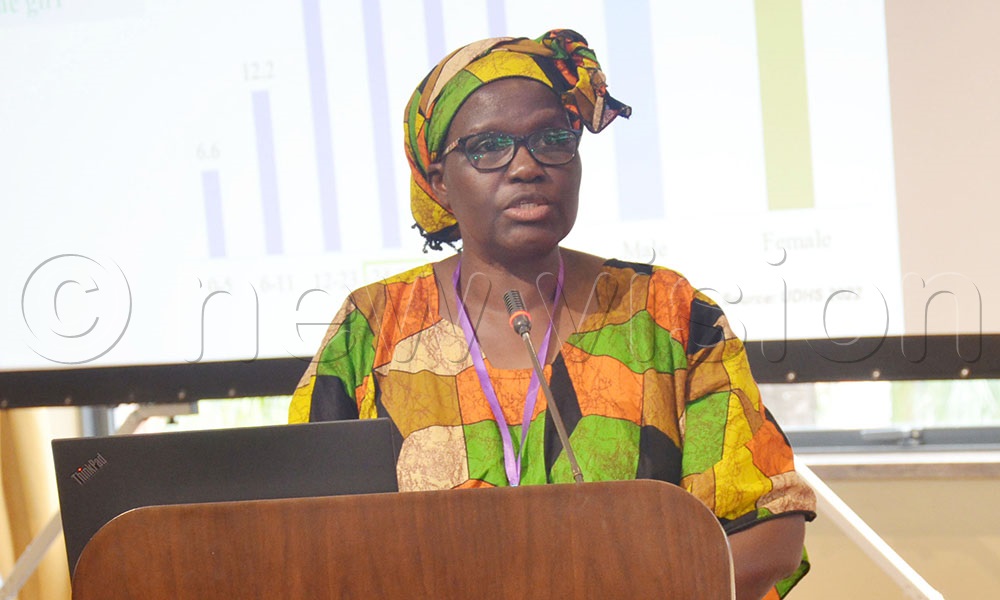Why govt is rooting for breastfeeding zones in workplaces
“We know there are mothers who are working. As such, we would like workplaces to be very supportive by providing an enabling breastfeeding environment,” said Samalie Namukose, the assistant commissioner in charge of nutrition at the health ministry.
A midwife at Kawempe National Referral Hospital supports a new mother to breastfeed. (Credit: Agnes Kyotalengerire)
Uganda's health ministry has urged workplaces to set up breastfeeding corners for working mothers to enhance their productivity.
“We know there are mothers who are working. As such, we would like workplaces to be very supportive by providing an enabling breastfeeding environment,” said Samalie Namukose, the assistant commissioner in charge of nutrition at the health ministry.
She told New Vision that establishing breastfeeding corners in workplaces will give a chance to new mothers to breastfeed during break time, then return to work, which she believes will enhance their job performance or productivity.
Similarly, the new mothers should get support at home, especially from their husbands — for instance, spouses helping with household chores to allow the mothers time to breastfeed their babies.
The call came as Uganda commemorated the World Breastfeeding Day on Tuesday (August 12) at Sheraton Hotel in Kampala, themed around prioritising breastfeeding by creating sustainable support systems.
Echoing the theme, Namukose said creating sustainable support systems starts with supporting mothers to breastfeed successfully; initiate breastfeeding in the first hour of delivery, and exclusively for six months without giving anything else, and then up to two years.
The Uganda Demographic Health Survey (UDHS 2022) reveals that over 90 per cent of babies in Uganda are initiated on breastfeeding within the first hour after delivery. Worth noting, about 87 per cent of the babies are breastfed exclusively (that is, feeding the baby in the first six months on breastmilk only).
At individual level, the mother should be empowered with knowledge and skills by trained health workers to support them breastfeed optimally.
Additionally, expectant mothers are encouraged to deliver at the health facilities. Upon being discharged, the community structures, including the village health team members (VHTs), mother care groups, and other family care groups, are expected to provide further support.
Samali Namukose, the assistant commissioner in charge of nutrition at the Ministry of Health. (Credit: Agnes Kyotalengerire)
Benefits
Feeding babies exclusively breast milk for the first six months of life, and then continuing to breastfeed for two years and beyond has benefits.
For instance, breast milk provides a baby with ideal nutrition and supports growth and development. Particularly, the first yellow milk colostrum protects infants from infection.
Mothers who breastfeed especially soon after birth are less likely to experience post-partum haemorrhage (bleeding after birth).
As such, breastfeeding supports the reduction of bleeding by stimulating the release of oxytocin hormone, making the uterus contract quickly, according to Dr Joseph Nsenge, a senior consultant obstetrician/gynaecologist at Bethany Women and Family Hospital in Luzira, Kampala.
Breastfeeding also helps with natural child spacing. Nsenga says mothers who breastfeed exclusively and have not gotten their periods have higher chances of not becoming pregnant in the first six months after birth.
“Breastfeeding increases the release of prolactin, a hormone which interferes with ovulation, hence preventing conception,” he explains.
Additionally, the practice protects women against the risk of breast and ovarian cancers by up to 25 per cent.
Notably, mothers who breastfeed show less postpartum anxiety and depression than formula-feeding mothers.
Breastfeeding also promotes bonding between the mother and the baby. And on the financial front, breast milk is the best investment as it relieves parents of the cost of buying formula, says Namukose.